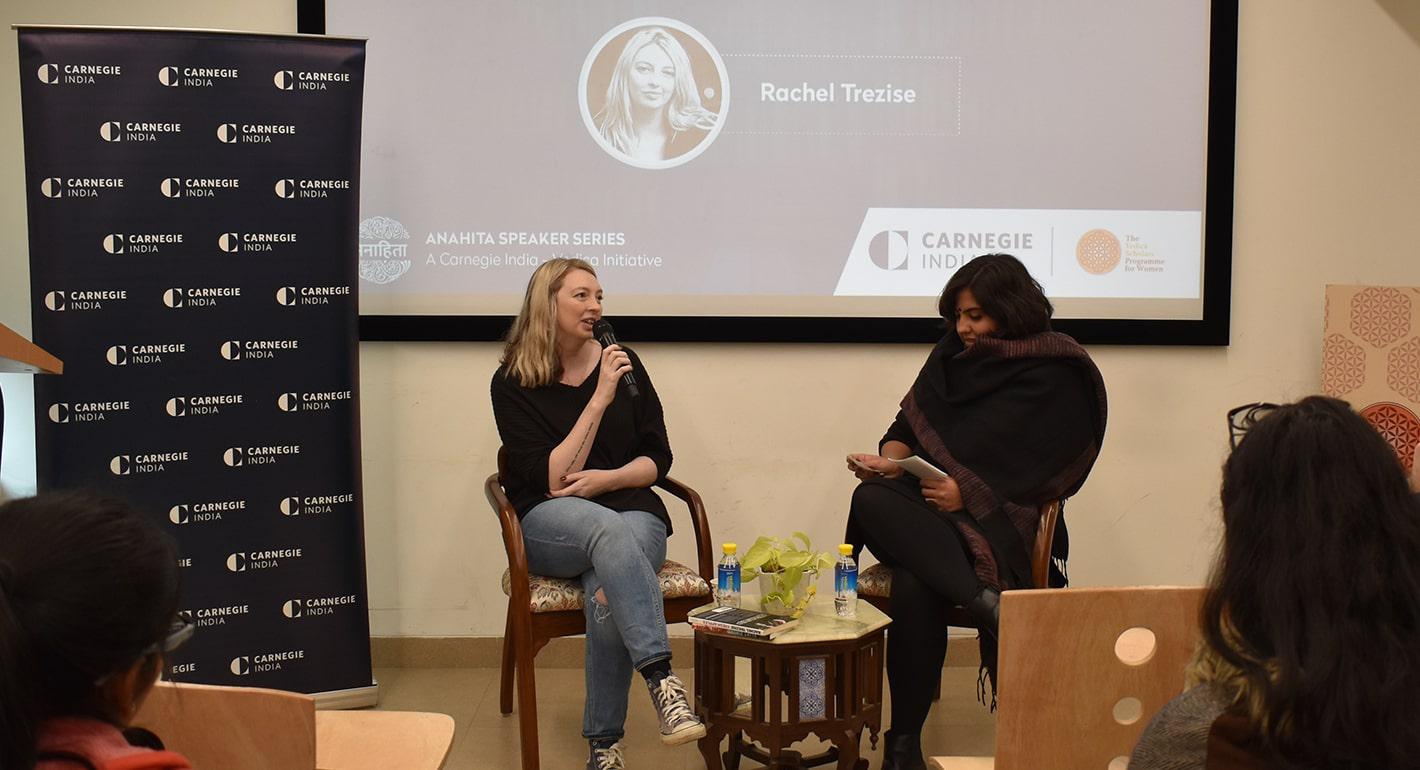Registration
You will receive an email confirming your registration.
The Anahita Speaker Series, an initiative by Carnegie India and the Vedica Scholars Programme for Women, is a monthly women’s speaker series that aims to highlight the experiences and achievements of women professionals who are giants in their fields.
The literary voices of women have often been ignored or suppressed. The bias in this sphere extends not only to reviews, but also manifests in the unequal gender representation on bookshelves. In the last decade, writing for and from a woman’s perspective has been a strongly debated subject.
In the first Anahita Speaker Series session of 2020, Rachel Trezise drew on her experiences to unpack what writing from a female perspective entails.
Discussion Highlights
- Writing Across Mediums: Discussants noted that writing isn’t limited to novels. Drawing on their own experiences, they stated, that writing can take various forms including poetry, plays, and journalism. Participants highlighted that for an author, the process of writing a novel can be a solo journey unlike writing a play. They explained, writing a play is more of a collaborative experience as the writer may interact with the director of the play, the stage-manager, and the actors portraying the characters. Discussants also noted how writing a play affords the writer much more freedom to experiment with combining two forms of writing in one, such as writing a play which includes poetry in it. Participants also stated that short stories are a good medium for budding writers.
- Understanding the Welsh Writing Culture: Participants discussed the Welsh writing culture and noted that like most literature across the world, Welsh literature was a male-dominated space till very recently. Participants highlighted the relevance of native Welsh literary giants like Dylan Thomas. They noted that the aim has been to discover the next Dylan Thomas-like author that emerges from within the Welsh literary culture once again. While several authors may strive for the kind of recognition that Dylan Thomas gained, the participants stated that some authors choose to create their own identity and eschew any comparisons to Thomas and his work. Discussants also stated that as the Welsh writing culture is still emerging, the pool of Welsh authors is currently small. Even though a writer may not write in Welsh, the discussants noted the various ways in which the Welsh culture could be evoked. This could take the form of introducing Welsh locales to the reader or using Welsh references or history while writing.
- The Authors’ Perspective to Writing: Participants addressed the various challenges that accompany the writing process. They noted that the process can seem daunting, but the advent of the internet has made it easier to reach a wider audience. Participants traced the speaker, Rachel Trezise’s, journey as an author. While she initially began writing fanzines, she published her first novel at a relatively young age and then went on to write plays. Participants also emphasized the ways in which real life experiences can be turned into plot lines. They noted that observation is key to the process of writing as the aim is to capture nuances that others may miss out on. Participants also briefly spoke about how the authors’ familiarity with spaces can lead to stories that can evoke the sense of a place even though the reader may not be familiar with that space.
This event summary was prepared by Shreyas Shende, an executive assistant and research assistant at Carnegie India.
Speaker
Rachel Trezise
Rachel Trezise (1978) is a novelist and playwright from the Rhondda Valley in South Wales. Her debut novel In and Out of the Goldfish Bowl won a place on the Orange Futures List in 2002. In 2006 her first short fiction collection Fresh Apples won the inaugural Dylan Thomas Prize, the biggest international award for an English-language emerging writer. Her second short fiction collection Cosmic Latte won the Edge Hill Prize Readers Award in 2014. Her first play Tonypandemonium was produced by National Theatre Wales in 2013 and won the Theatre Critics of Wales Award for best production.

